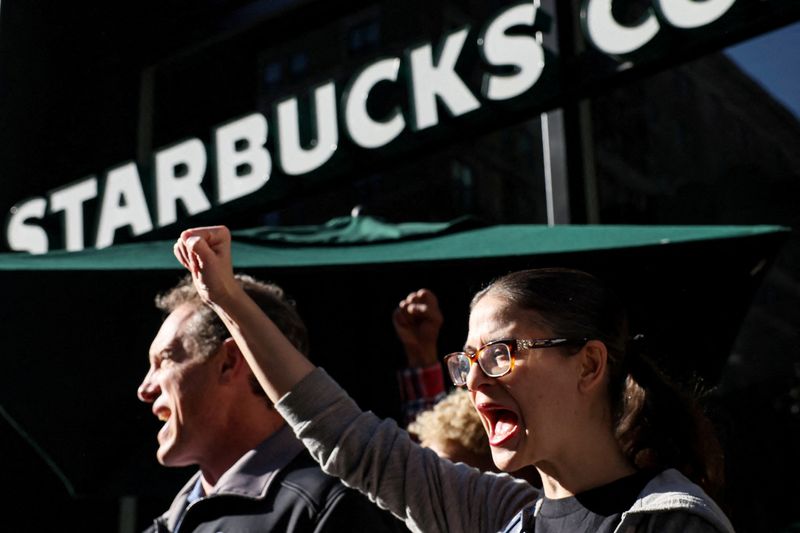By Waylon Cunningham and Daniel Wiessner
SAN ANTONIO, Texas (Reuters) - Starbucks (NASDAQ:SBUX) union representatives want to create a national template for labor contract negotiations with the coffee chain, according to union organizers - an idea a Starbucks spokeswoman said the company believes is "speculative."
The union, Workers United, has organized nearly 400 stores out of the company's 9,700 U.S. locations since 2021, and is seeking to organize more.
Starbucks so far has sought to negotiate only individual contracts store-by-store. The union has argued this is a delaying tactic.
The union and Starbucks said on Tuesday they had agreed they would create a "framework" to guide organizing and collective bargaining and potentially settle scores of pending legal disputes.
Workers United wants the framework to include hashing out a national template contract for bargaining that individual stores would adopt, two union organizers told Reuters.
Starbucks spokeswoman Rachel Wall said the only agreement between the company and union leadership has been to begin discussion on a framework.
"We're eager to schedule that meeting soon, in the coming weeks, I'd hope," she said. She referred to the talk of a national template for bargaining as "speculative."
Workers United declined to comment.
Reagan Skaggs, a union organizer at a Starbucks in Valparaiso, Indiana, said the conversation currently appears to be moving toward a national union front, "which is fantastic."
Quinn Craig, a former barista and organizer at Texas' first unionized Starbucks, said under the preliminary discussions, Starbucks has agreed "instead of going through (the bargaining) process with all stores, we would bargain a national baseline contract for everyone, and then go around get all of the specific needs met."
The union claims that Craig was illegally fired last summer for participating in a walkout. A spokeswoman for Starbucks said Craig “was separated from our store for clear violations of established cash-handling and workplace violence policies and failure to adhere to store alarm protocols,” not in retaliation for union activities.
MILESTONE CONTRACT
Beyond Starbucks, a national bargaining process would mark a significant milestone for nascent efforts to organize the service sector.
"No other chain has had something like this, but we have to understand that there's no other chain that's been organized in so many different places so rapidly," said Ileen DeVault, a professor of labor history at Cornell's School of Industrial and Labor Relations.
In recent years, union-backed organizing groups such as Fight for $15, which focuses on fast food workers, and OUR Walmart (NYSE:WMT) have sought to pressure major companies to engage in large-scale bargaining by staging strikes and protests and filing legal complaints against employers. But those efforts, including at fast food giant McDonald's (NYSE:MCD), have largely stalled.
Newer campaigns, including efforts to organize workers at Starbucks, Amazon.com (NASDAQ:AMZN), sporting goods retailer REI and Wells Fargo, have largely focused on unionizing individual workplaces.
DeVault said a national bargaining table would be beneficial for both sides, considering the hundreds of sites.
"It's not like Starbucks has a whole troupe of labor relations people who can run out to these different locations and bargain."
DeVault said similar arrangements have been made outside of retail and food industries. Last year the Teamsters, the union representing roughly 340,000 UPS workers, ratified a master contract alongside local supplemental agreements.
Lane Windham, a labor historian and professor at Georgetown University, and a former labor organizer, said U.S. contract negotiations function differently than in many other countries, usually through individual workplaces.

Other countries such as Germany and France tend to have sectoral bargaining, Windham said, where unions negotiate contracts with employers across an entire industry.
"It's been a long time since we've seen something like this, and certainly never in the service sector," Windham said. But, she continued, "It hasn't actually happened yet."